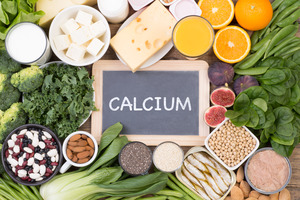
There are many steps you must take if you want to be able to protect your teeth for life. In addition to keeping them clean by brushing and flossing every day, you also need to eat the right kinds of foods to keep them healthy. And when it comes to maintaining strong teeth, there’s one nutrient in particular that you should make sure that you’re getting plenty of: calcium.
Why Is Calcium Important for Oral Health?
Calcium is an important component of the enamel that protects your teeth. Over time, the acids produced by oral bacteria can cause your enamel to lose minerals, causing it to weaken. But if you have a calcium-rich diet, you can repair the damage to your enamel and strengthen it so that it can continue warding off tooth decay.
Additionally, calcium is essential for keeping your jawbone in good shape. Without it, your jaw would severely weaken and break more easily.
How Much Calcium Should You Get Every Day?
You should be getting around 1,000 mg of calcium every day if you’re between the ages of 19 and 50. Of course, your dietary needs can vary depending on your overall health, your genetics, and other factors. It’s a good idea to talk to your regular doctor if you have any concerns about your calcium intake.
What are Some Good Sources of Calcium?
When you hear the word “calcium”, what immediately comes to mind? For many people, the answer is milk, which contains about 200 mg of calcium in each cup. Cheese and yogurt are also known for their high calcium content.
But dairy products aren’t your only option. Calcium can be found in plenty of other foods as well. Some surprising examples include canned sardines, poppy seeds, dark leafy greens such as spinach, almonds, white beans, and tofu.
If you aren’t getting enough calcium through your regular diet, it may be a good idea to take supplements. However, an excess of calcium can lead to health problems such as kidney stones. To be safe, you should consult a physician before taking supplements of any kind.
What About Vitamin D?
Vitamin D aids your body in absorbing calcium. As such, if you want your smile to get the full benefits of a calcium-rich diet, you need to ensure that you’re getting enough Vitamin D as well. This nutrient can be found in fatty fish, egg yolks, and red meat.
Are you getting enough calcium to maintain a healthy smile? Talk to your dentist at your next checkup to see if there are any adjustments you can make to your diet to help protect your teeth.
About the Author
Dr. Lauri Barge has been selected as a charter member for the local chapter of the Seattle Study Club, and she is a member of the Texas Dental Association as well as the Denton County Dental Society. She always carefully tailors her treatments to her patient’s dental needs. If you are concerned about the health of your smile, you can schedule a consultation with Dr. Barge at her Flower Mound practice by visiting her website or calling (972) 539-3800.
